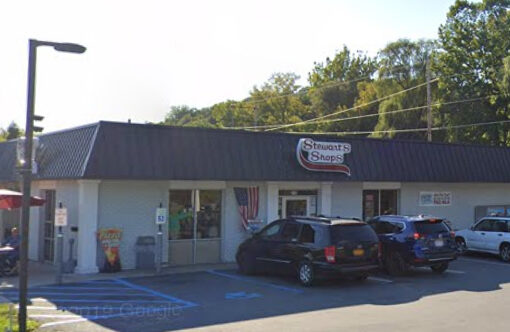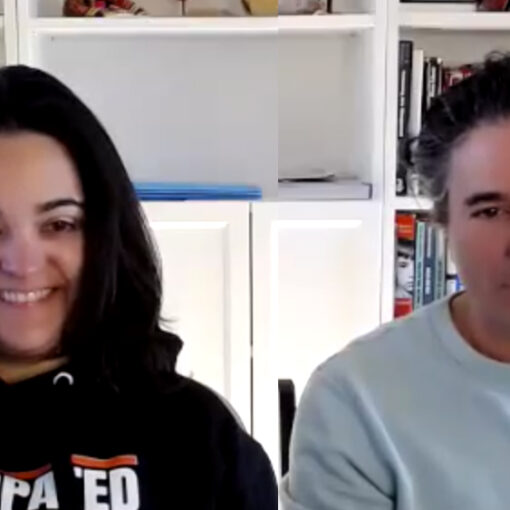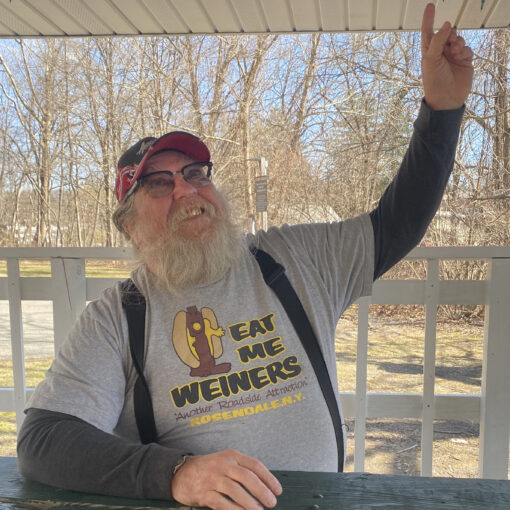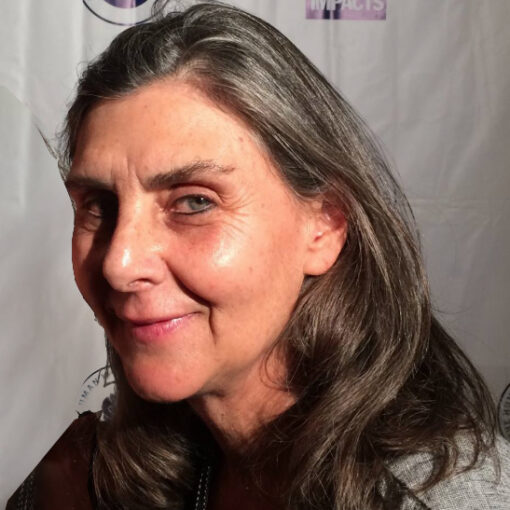Bill by Ruthie
Jan 24, 2024
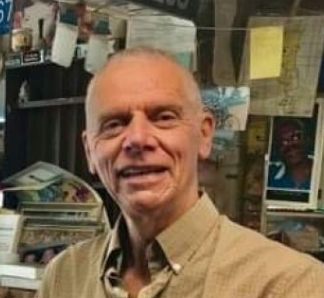
Bill by Ruthie
Jan 24, 2024
R: Bill, how did you come to live in Rosendale?
B: Well, I’m an import from High Falls.
R: High Falls is Rosendale.
B: And I’m just across the border now.
R: That’s right.
B: In 1966, I opened up a business in Rosendale, a barbershop, and I’m still there.
R: What’s keeping you there?
B: Rosendale!
R: What about it?
B: I like it because I’m in town. I had a chance to move a distance away and it wasn’t around a community. And I chose to be in middle of Rosendale. And I guess some of people are still there. And I get involved in a few different things. I was a fire commissioner for 20-something years. And I’ve belonged to the fire department since I was 17 in High Falls. And I’m still in fire department. Yeah, I like it because it’s a community. And the people are great.
R: And when you had the opportunity to or did briefly move away, was it that the community was different or you were too removed from a town?
B: No, before I came to Rosendale, I had served my apprenticeship and I was looking for a place to set up.And the guy that I used to go to for a haircut, he was retiring. And I rented from him for a couple years and then bought a place in there.
R: And what do you do about the fire department?
B: Well, as former commissioner, I still get to put my two cents in. The fire department is a volunteer organization. It’s a group of people who are actually putting their life on the line to protect the community. And I get drawn to non-profit organizations. And that’s how I went up to the Lions Club. I’ve been a member since 1980.
R: So besides wanting to be within the community, you’re really active in your community and have been for a really long time.
B: Yeah. And then the Picklefest came along, which was a fluke. I had a friend who lived in Tokyo and would come over here. She got so she would stay with us at our house. But she would call and say, “oh, I’m in New York City. I’ll be up tomorrow.” Okay, I guess we’re getting company! And she passed away during COVID over in Japan. But we were friends for, I don’t know, 25, 30 years. And so. She came, she came over here one, one time in one of our visits. She would come over like three times a year. And she’d always stay with us. She was here for a short time in the month of September. And she said, “I’m bringing over some dignitaries from Japan. And I’d like to have a party for them. Can you help?”
Yeah, we’ll help you. We were good at throwing parties. And before she left, she says, “oh, they like pickles!” And that one line led to Picklefest.
R: Really?!
B: No, just from, no, they like pickles. So we formed this party around pickles. And we did very little advertising because it was a total of two months between the time she told us and when they were coming over. So it didn’t give us much time. We put some flyers out about this party and 900 people came.
R: Oh my gosh.
B: That was the first one – 900 people came. We had it at the rec center. And I was like, wow, that went pretty good!
R: And what year was that?
B: 1997.
R: Do you still have the flyer for that first one?
B: Yeah, I think I do.
R: I would love to see it.
B: I have a tendency, as a historian, to save history.
R: That’s fantastic. And I’m glad to hear that this year’s picklefest went really well. You should know that my partner and I have just loved picklefest. He and our friend Louis were masters of the pickle toss. You remember Louis?
B: Yeah, I got a picture of him in the shop with his mouth open. The pickle was in the air and it hadn’t reached him yet. How’s he doing?
R: He’s doing pretty good. Well, my partner is the one who would throw them to Louis. And I brought my kids a couple of times and they are just fascinated. I wasn’t able to bring them this year. But picklefest, you’re really onto something there.
B: Yeah. And we did it as a party. I always try to make it so that people felt like they were going to a party.
R: That last one was a bit hectic.
B: But first of all, we didn’t do it for money. We made it as a get together. And it worked. So, I mean, I think the first years, we charged $5 a family because you had tents and you had a lot of stuff, you know, put together and cost money. So we wanted to cover the goods. At $5 dollars a family, so you, your partner, your four kids, your aunt, uncle, and their, you know, $5. And now we’re up to $5 for an adult. So we have put over $200,000 back in the community.
R: Thank you for that!
B: And in other words, we don’t want the money. And that was a problem at the beginning. You know, all of a sudden we had money, and the wife and I, and we don’t want this – we’ll have to distribute it. And that’s what we’re doing now.
R: What kind of things do you do with it?
B: Library, youth center, the food pantry. And now it has expanded. Because it’s more money.
R: So all the best parts of Rosendale. And so if you were to have someone come from out of town, and you wanted them to experience a quintessential Rosendale experience, what would you do with them and where would you bring them?
B: Well, first, I have to go to the Big Cheese and have lunch. And then, and then the Snyder Estate. Tell them about the cement industry. And then take them to my office.I’ve got like a hundred and fifty pictures and documents and stuff framed and hanging on the walls. Have you been down there, the Rosendale Wing?
R: Oh! No.
B: Yeah, the Rosendale Wing. My office is very small. They’re giving me an overflow area now. Over where the highway department is in Maple Hill. Yeah, they sort of got more than they bargained for when I became town historian. The previous town historian died and it’s required that the town have a historian.So they asked me about being a town historian. I said, well, what are my obligations? I said, well, if somebody has a question, that we don’t have an answer for, we ship them to you. And I said, well, where’s my office?
R: [laughs]
B: And they, yeah, that’s what they did, they laughed! They laughed. Well, the town historians never had an office, and I’m thinking, like, museum, you know, and they’re thinking about this guy wants an office. And I said, well, where’s the collection? Well, you don’t have an office. You don’t have a place for a collection. And the previous town historian, who was in her home, she died and didn’t have family. And she willed the house to somebody. And in it was the town historian’s collection. And they wouldn’t let it go. They wouldn’t sell it. They wouldn’t. Nothing. So I wound up with zero as town historian. I had nothing. So, I filled up my office and now I’m going to the overflow area.
R: Okay. So you have a good start now.
B: Yeah. I think it’s seven, eight, ten years now. I don’t keep track. It’s fun. It seems like the more you dig into things, the more stuff you find, the more complicated it gets. And then because one thing leads to another. And they, but I get some really good calls.
R: you do?
B: “We just bought a house up on James Street and we’d like to know the history of it. Yeah. Okay. And the houses were built in the 1800s. And they, how do you, how do you give them a history? “You know, or the name of the, the name of the people that we bought it from was Smith.” Yeah. Okay. But I’ve learned a lot by being town historian. But there’s a lot that I don’t know.
R: Well, there’s so, like you said, the more you learn, the more you have to learn.
B: It’s interesting.
R: Those calls that must be really fun though, to get a call like that, but where you have to suddenly dig into something-or you get to, rather.
B: Yeah. And you meet people. Oh, you’re new in town.
R: Yeah. And what do you think about the changes that have been happening in Rosendale?
B: Well, I, being, I opened up in 66. I saw, you know, things climb. And then we do a dip and then we climb a little bit. I’ve seen buildings that have had five or six different businesses. And there were times when they were empty. When there were the hippie days. And people were renting businesses to live in. And they-strange enough! Now it’s happening again. And people are so desperate for a place to live. I had a rental, I was empty. That was a business office. And I said, I don’t have any, I just have one, I have one office that’s available. But they said, oh, can we see it? And I said, no, it’s a business. Yeah. When I built it. So it would be a business to, it’s got three offices and two apartments. So, and people, I consider, they’re desperate for a place to live.
R: And that’s that place behind the barbershop.
B: Yeah. I put that up like 12 years ago. It’s working good. I’ve got 10 rentals.
R: I’m sure that’s a lot to manage. A lot of different personalities with some high stakes.
B: “I have to pay rent?” Um, but I, I don’t know, it’s dealing with people. So it’s a challenging experience.
R: And what are your hopes for Rosendale? Where do you consider us right now? Are we in one of those dips that you’ve seen? Or are we on the up and up?
B: We’re, I think we’re right in the middle.
R: Going up or down.
B: Stabilized.
R: The plateau.
B: So, yeah, I put three businesses in there because I wanted to see more business in town. And if they don’t have a place to open a business, they’re not going to, they’re going to go somewhere else. So I put in three, three offices and two apartments. So they were a little mixed and I was hoping somebody else would pick up on that. Well, before that lot was there, it was a church. I forget what denomination it was. And then it became a Grange, like a farmer’s organization. And then when I bought the barbershop, the guy came along and bought the Grange or the church. So in the meantime, going back to opening up on Main Street, my timing was off because long hair was becoming popular. And then, and I was like, maybe that wasn’t really a good idea. But then a friend of mine, he says to me, I believe he says, I’m going up to Manann’s market. It was a market where farmers brought their goods in the summer and then in the spring, they had all the bedding plants and everything. And you go up there and buy the wholesale place. So he wanted me to go up with him. He says, you could get a couple flats of plants and put them on your porch. You know, sell them all from the barbershop. Well, five years later, I had a garden center in that spot. I went around the building and I was under the sidewalk. And I did that for 30 years, along with the barbershop.
R: Great combo.
B: And that was fun. Except for getting up at three o’clock in the morning to go up to Manann’s market, you know. But, that was a nice sideline.
R: Are you still cutting a lot of hair?
B: No, I do four mornings a week.
R: That’s nice. That’s quite a bit.
B: A guy called up this morning. He said, “can you take me at 4.30 this afternoon?” And I says, no. I says, I’m an old man. I says, I can’t. I say, I only work a few hours a day, four days a week. And it’s in the morning. “So, you’re asleep by 4.30, right?” You’re asleep by 4.30. I also plow snow. Twenty-seven customers. And two parking lots. So, between the plow and snow. The rentals. The fire department. I do well.
R: That’s great. What are your hopes for Rosendale?
B: Well, your hopes are always high. The big downfall is that the town was built 200 years ago. And the streets were narrow. And there was a time. There was parking on both sides of Main Street. And I have a picture. I think it might be on the wall down there. This car is parked here. The car is parked on the other side of the street. And somebody got a smart idea. And they parked two cars in between them. And there’s a picture of four cars across. That you could fit four cars through, in other words, car parked on each side. And two cars, if they inhale, they’ll pass each other on the street. And parking’s probably everywhere. I mean, whether it’s Rosendale, Kingston, or wherever. So I have eight parking spaces, which is like a bonanza, you know? Because most people that rent on Main Street, they don’t have a place to park. Because the buildings that face the creek, you can barely fit between the buildings. So I feel privileged that I have eight parking spaces, you know, off the street. So it’s sort of hard to get past that, I mean, a new business opens up. And you say, oh, you know, hallelujah. And then, you know, somebody’s going down the street. And you’re looking off to the left side, like heading toward High Falls, And it’s, “oh, a new business. There’s no place to park.”
R: Yes, you’re absolutely right about that.
B: Okay, now there’s parking behind the theater, but half of that parking is for the theater. So parking for off street is like canal bed is back there. So from there, back to the kilns, is town parking. And it’s full. You know, people need a place to park and to get a business in there, they’re going to look, see where their customers are going to park. And they say, oh, “behind the movie theater. But keep going.” You know, it’s behind, behind the movie theater. And I plow that also. And trying to get in there when there’s nobody parking in the parking lot. It’s pretty tricky. So, you know, parking. If they built a nice three story garage.
R: Oh, yeah. Where do you suggest to do that? Back there by the building park.
B: I’m dreaming. Because it was too, it was parking on both sides of the street. When I first moved on Main Street. And I think about two weeks later, they decided to make only parking on one side of the street. So there I was. I had two sides of the street parking for a month. And it’s nothing to do about it. I mean, when I had the garden center, oh man. People, you know, look at the flowers, you know. And they look for a place to park.
R: There’s someone waiting behind them.
B: So, I think that’s a major. And what do you do about it? I don’t know. What do you do about it?
R: I don’t know either. Somebody knows.
B: But the parking behind the theater, they should make more notice that it’s there. I think they do have a sign or two, but it needs to be more accented.
R: I wonder where else they might be able to have a little bit of parking.
B: Not until you get down to where there used be the Rosendale Cafe. And the only reason they got a nice parking area, because there were two buildings there that burned down.
Actually where my barbershop is, if you’re standing looking at the barbershop. On the right side was the three-story hotel. And on the left side was the church or the Grange. And they burned down, I think it was 30 years to the day almost. That one burned and then the other burned.
R: Really?
B: Yeah. January 15th. And then one was the 16th and one was the 15th.
R: Oh my gosh. But 30 years apart. Were they accidental?
B: Yeah. One was a heating system and the other one, you know, it was a brick building, the hotel. But the inside of it was all wood.
R: Yeah.
B: When that, I think that was electrical. And once they start burning, they’re old, you know, I got pictures of it in 1903, that building. And they’re dehydrated. So when the spark hits it, it burns.
R: Yeah. So Bill, what would you miss about our community if it wasn’t here?
B: Barbershop.
R: And is there anything else that you want me to capture in this interview? Any other thoughts or feelings or hopes or dreams about Rosendale?
B: Well, the fact that I’m still there after, what, 60 years?
R: It’s pretty good.
M: You’re going to be 80 this year.
B: Yes. Oh, I am.
M: My oldest brother turns 80 tomorrow.
B: Well, I met him.
M: I think you did. And it might have been at your house.
B: I think maybe it was.
R: Bill, thank you so much for the interview.
B: I’m sorry if we, you know, we might have got off the track.
R: Well, no, no, that’s exactly exactly what we want to do.

